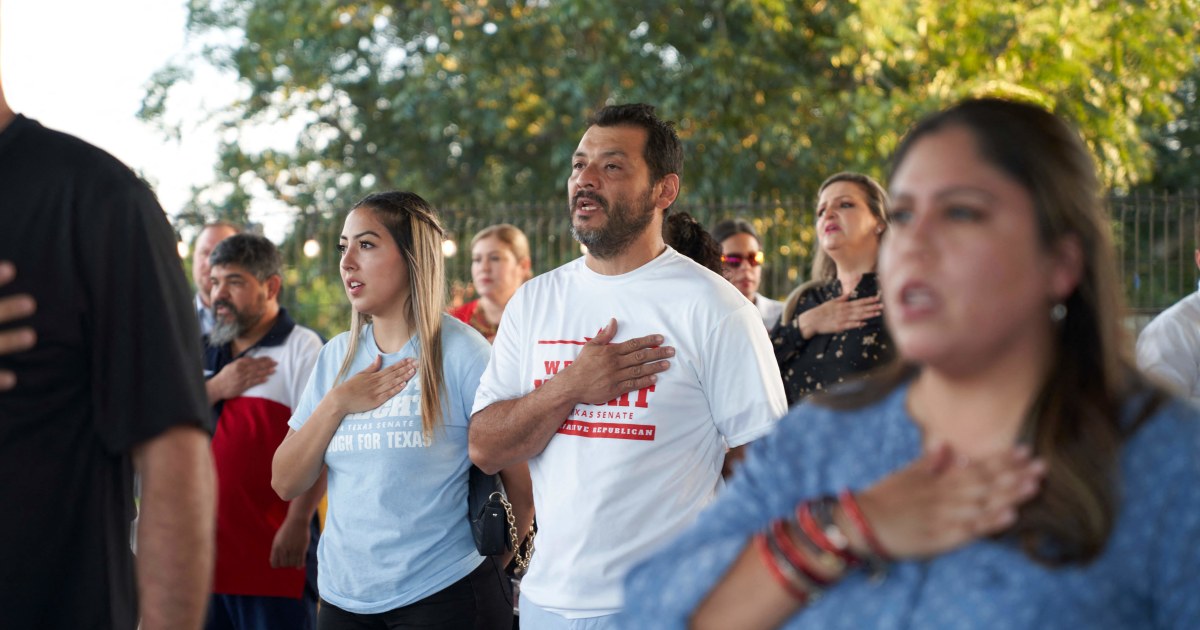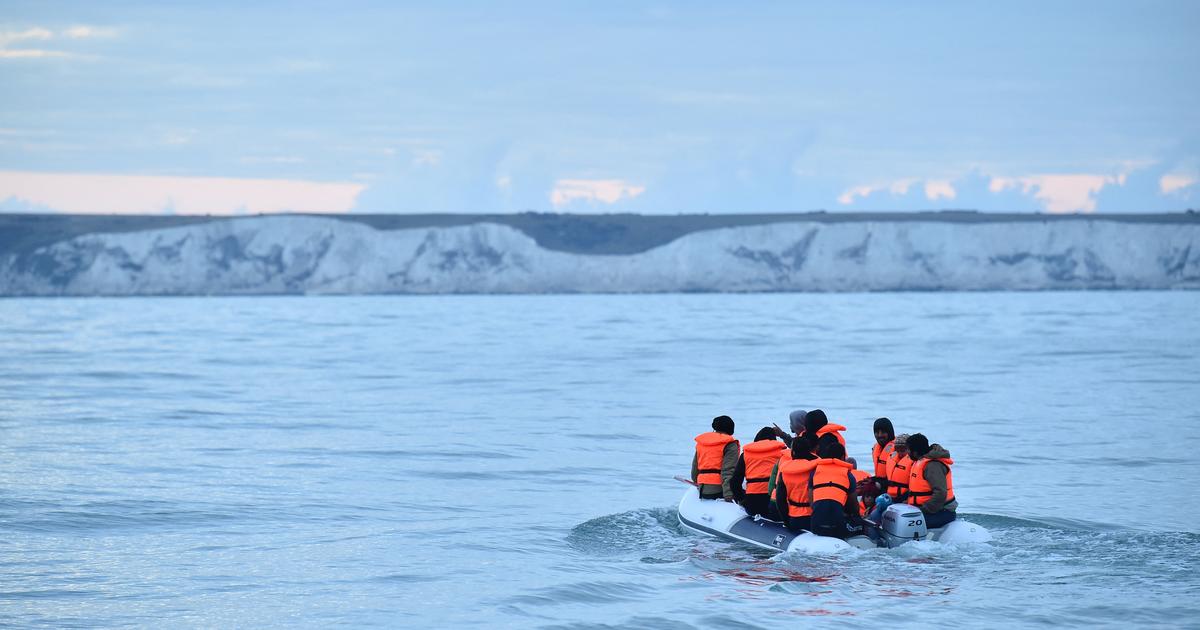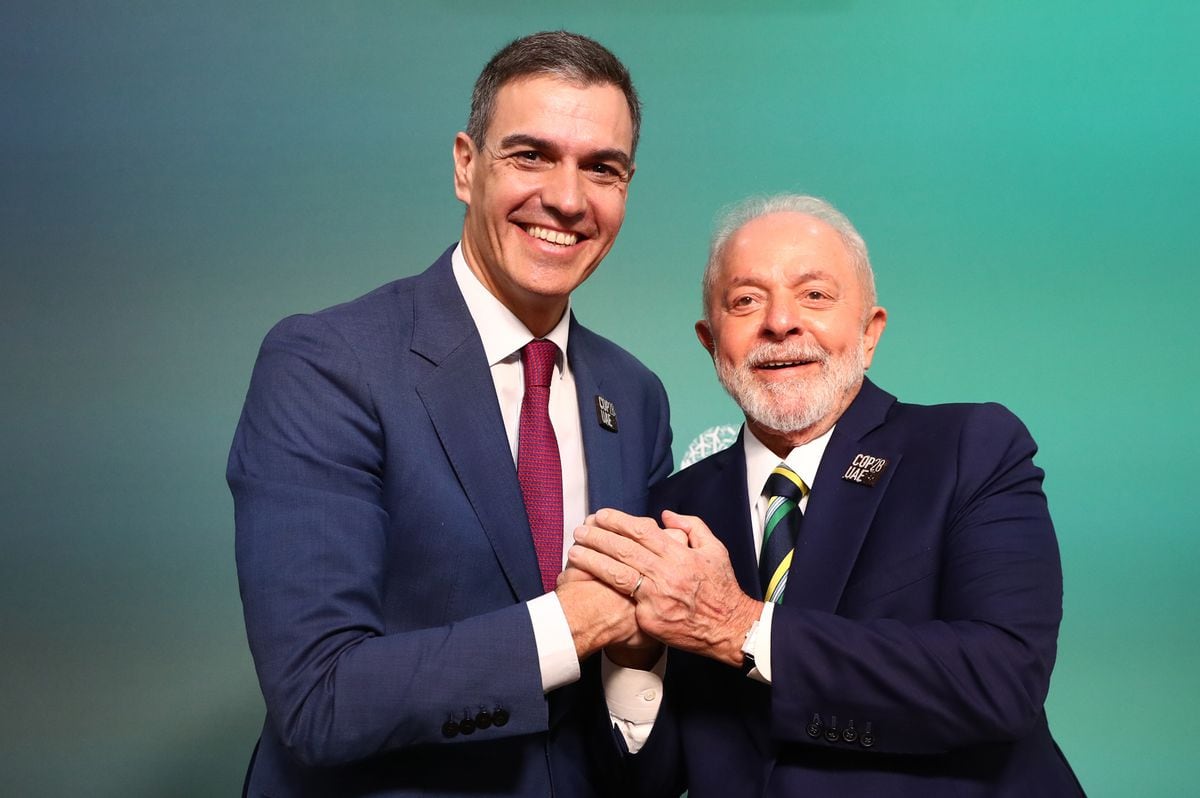European record for asylum applications. Spain adds, for the first time, more requests for refuge than any of the community partners, according to official data from the European Asylum Support Office. The deep crisis in Venezuela and the violence that spreads in several countries of Central America and Colombia have triggered the numbers in the last three years, up to 118,000 applications in 2019. At the start of 2020, the figures escalate to 3,500 weekly requests. But only 5% of these requests end up being recognized: Spain is at the tail of Europe, with figures similar to those of Hungary and far from the EU average (30%).
MORE INFORMATION
- Spain is already at the tail of the EU in asylum concessions
- Almeida again asks Sánchez for a solution for refugees
- Melilla, a maze for migrants
- Spain will harden the right to asylum
The drama of Patera Copa travel on the news, but another phenomenon - more silent - comes through the airports and is one of the main migration challenges in Spain: asylum seekers, people seeking refuge after fleeing violence or of the persecution. In the offices of the Spanish authorities, the statistics that arrive every week from the European Asylum Support Office are carefully followed. The provisional figures, to which EL PAÍS has had access, reflect an evolution of vertigo in Spain. In November 2019, records were broken with the arrival of more than 3,600 people per week. And at the start of 2020, the third week of January registered more than 3,700 applications.
This opens an unprecedented scenario. Spain did not reach similar figures even in 2015, when the Syrian war pushed more than one million refugees into Europe. That year Germany received almost 500,000 asylum applications; Spain did not reach 15,000. The historical maximum was reached in 1993, in the context of the Balkan war.
Changes in migration macro-trends never have a single explanation. The cocktail of factors that has made Spain lead the reception of potential refugees begins in the Mediterranean, but the causes must also be sought in the immigration policies of the president of the United States, Donald Trump, against the caravans of Central Americans and, above all , in relation to the Venezuelan regime of Nicolás Maduro. The EU agreements with Libya and Turkey to contain the routes to Italy and Greece have shifted migratory pressure to Spain. But it has been the crisis in Venezuela and the violence of the gangs in countries such as El Salvador and Honduras that have led tens of thousands of people to seek refuge in Spain, due to historical, cultural and linguistic ties with Latin America. “To speak of asylum in Spain is to speak of Latin America,” warns Blanca Garcés-Mascareñas, a researcher at the Barcelona think tank CIDOB.
Many of the current applicants in Spain come from Venezuela (35%), Colombia (25%), Honduras (5.8%), Nicaragua (5%) and El Salvador (4%), a profile very different from that of the Syrians, Afghans or Iraqis arriving in Germany, Greece and France. "Most of the asylum seekers in Spain do not flee a war in the traditional sense, but rather flee from structural violence," says Garcés-Mascareñas.
Asylum applications
2020 breakdown
Total
17,457
1st week
1,073
15,305
14,767
2,955
2nd
12,022
3,731
3rd
3,683
4th
3,503
5th
6th
2,512
Spain
Germany
France
Greece
Evolution
118,264
120,000
100,000
80,000
59,551
60,000
40,000
31,120
20,000
0
06
07
08
09
10
eleven
12
13
14
fifteen
16
17
18
19
twenty
(First six weeks)
Origin of applicants in 2019
151,824
Syria
25%
126,363
117,463
Afghanistan
7.8%
Iraq
9.1%
Venezuela
35%
Albania
7.2%
Turkey
7.3%
Colombia
25%
Georgia
6.4%
Honduras
5.8%
Germany
France
Spain
Source: Source: CEAR and European Commission.
THE COUNTRY
Asylum applications
2020 breakdown
Total
17,457
1st week
1,073
15,305
14,767
2,955
2nd
12,022
3,731
3rd
3,683
4th
3,503
5th
6th
2,512
Spain
Germany
France
Greece
Evolution
118,264
120,000
100,000
80,000
59,551
60,000
40,000
31,120
20,000
0
06
07
08
09
10
eleven
12
13
14
fifteen
16
17
18
19
twenty
(First six weeks)
Origin of applicants in 2019
151,824
Syria
25%
126,363
117,463
Afghanistan
7.8%
Iraq
9.1%
Venezuela
35%
Albania
7.2%
Turkey
7.3%
Colombia
25%
Georgia
6.4%
Honduras
5.8%
Germany
France
Spain
Source: Source: CEAR and European Commission.
THE COUNTRY
Asylum applications
2020 breakdown
Evolution
118,264
120,000
Total
17,457
100,000
1st week
1,073
15,305
14,767
2,955
2nd
80,000
12,022
3,731
3rd
59,551
60,000
3,683
4th
40,000
31,120
3,503
20,000
5th
0
6th
2,512
Spain
Germany
France
Greece
06
07
08
09
10
eleven
12
13
14
fifteen
16
17
18
19
twenty
(First six weeks)
Origin of applicants in 2019
151,824
Syria
25%
126,363
117,463
Afghanistan
7.8%
Iraq
9.1%
Venezuela
35%
Albania
7.2%
76,804
Turkey
7.3%
Afghanistan
31%
Colombia
25%
Georgia
6.4%
Syria
14%
Honduras
5.8%
Pakistan
9.2%
Germany
France
Spain
Greece
Source: Source: CEAR and European Commission.
THE COUNTRY
Luis Fernando, a 23-year-old Colombian designer who works in an NGO, was taken out of Cali in 2017 by force of extortion. One afternoon he received a letter - "the famous pamphlets" - at his house. “It is a statement sent by paramilitaries to many people; politicians, journalists, social leaders, NGO volunteers, officials, lawyers ... They made it clear that they considered me a military objective, ”he recalls. "I was in emparanoiado, I did not dare to go out and stopped working."
He ended up asking money from the lenders - "a Cofidis to the beast, controlled by armed groups" -. Surrounded by the threats of some, the pressure of others and the absence of a State that protected him, he left and ended up in Madrid in May 2019. "Here is a peace ... tremendous", he celebrates.
"It is very likely that the pace of applications will continue like this, taking into account the situation in Venezuela, Colombia or Central America," says Acnur's representative in Spain, Sophie Muller. Although the Ombudsman has been alerting for six years that the system needs to be strengthened, these numbers have taken Spain with a changed footing: the reception network and file management was obsolete and still insufficient. "The Office of Asylum is in an unfortunate situation," Interior Minister Fernando Grande-Marlaska acknowledged when he took office in 2018. The Office, although reinforced, continues on the verge of collapse: resolves files faster than ever, but closed the year with 120,000 pending applications. Spain, which now only grants 5% of the requests, has been placed in the tail of Europe, where 30% are granted on average. That 5% is similar to the Hungarian numbers, with an ultra-openly anti-migration government.
Cases that should be recognized or rejected in six months take a year and a half in Spain. The reception places managed by the Secretary of State for Migration are also not enough. Dozens of families would be sleeping in the streets of Madrid if it were not for the solidarity of pastors, activists and neighbors.
Temporary lifeguard
The funnel and the lack of alternatives to legally establish itself in Spain have turned the asylum system into a temporary lifeguard for foreigners who are not recognized as refugees. While the files are being managed, the applicants cannot be expelled and after six months they are allowed to work.
The reform of the refugee care model is a priority of the EU. The negotiation is played on a board in which the anti-immigration sentiment extends in several countries. The northern partners demand more control, while the countries of entry (Spain, Italy and Greece) ask for solidarity to spread the weight of the migratory pressure. "The position of Spain is based on a reasonable responsibility of the partners, not on the incredible current imbalance, which leaves the entire burden in the hands of the Mediterranean countries," diplomatic sources explain. Brussels works in a system of “mandatory solidarity” so that there is a relocation of refugees among a critical mass of countries, community sources added. That agreement is not close.
In parallel, the new model to manage the arrival of asylum seekers will be harder to discard and deport more quickly the so-called economic immigrants. “In this negotiation, the Spanish Government can play a leading role by establishing quality standards and designing a fair and agile asylum procedure that allows to quickly determine who needs international protection and who does not,” says Sophie Muller, the representative of Acnur in Spain. In this European pulse between border control and protection, Spain prepares its new asylum law. It was on account of this law, and the hardening of the Interior Minister's speech on immigration, so the PSOE and Podemos staged the first tensions in the Executive a few days ago. Interior proposals follow the restrictive path of Europe. The text, to which EL PAÍS had access, proposed restricting access to asylum to foreigners who were in detention centers and includes new grounds for denying applications.
With information from Julia F. Cadenas.
Leave the children in the most violent city in the world
Julia F. Chains
Flor Cárcamo feels like Alice in Wonderland when she walks the streets of Madrid after leaving San Pedro Sula (Honduras), where she has lived the last 31 years of her life. Nine months ago he left his two children - three and five years old - with what remains of his family, which still resists in the second most populous city in Honduras, the most violent in the world.
His relationship with violence has been something so daily that he lived it even naturally, as if it were something inevitable. Until eight years ago they killed one of his nine brothers, 29, when gang members tried to recruit him. Forensic police found his body a week later. Three years passed and Flor lost another, barely 20 years old. They never found the body.
He began to investigate. It already tied ends when something happened that stopped it: the call of a neighbor. "Hooded men are in a car chasing your girl." Flor has another daughter whom the gang members had been waiting for after school for weeks. They always did the same: they showed him photos of their two dead uncles and their mother. With this, they tried to send a message to Flor through his 10-year-old daughter.
He began processing the documents and looking for coyotes (people traffickers) to take his daughter to the United States border, where the father lives. He left his job in a T-shirt factory and spent all his time protecting it until the date of the trip arrived. 14 days, five coyotes, six cars and $ 12,000 later, arrived together at the border. Mother and daughter separated when she gave the power to a father whom the girl only knew through video calls.
Back in San Pedro Sula, the situation did not improve. He decided to report the threats he had suffered; nothing happened. The war between the gangs that control every block in their neighborhood intensified. Two of his brothers left for Mexico, another joined one of the caravans to the United States. Violence marked the rhythm of his family and eventually marked his own. And it was decided. For their children.
His sister-in-law lives in Spain and encouraged her. A few months later, he got on a plane to the Madrid-Barajas airport. But he did not ask for asylum immediately. I was afraid they wouldn't believe her and deport her. He settled with his murdered brother's wife and got a job caring for the elderly. Now he has changed his mind because the news that comes from San Pedro Sula is not good: he wants to bring his children to Spain before the gangs try to recruit them.
"They are growing." Flor's voice is truncated for the first time and he removes a tear in a quick gesture. He doesn't want sentimentalities: he wants to tell the facts. On January 22, he obtained an appointment to request asylum and told this story to a policeman. The agent, very professional, asked him why he had taken seven months to do so and his choice for Spain. "This is wonderland," he replied.
Forced to flee for refusing to accept a bribe
Juan Carlos Espinosa
The Colombian Fernando Bernal, video surveillance technician in a maximum security prison, refused to erase the images of the prison.
Working in prison has never been easy. Less if it is La Picota, one of the most important prisons in Colombia. In this center the great drug lords of the country are held. Behind those walls was Fernando Bernal (Bogotá, 38 years old) who was in charge of the maintenance of the video surveillance system. His work was only technical, without risk. But that changed with an indiscreet request from the guards: "We need you to delete the recordings [from the cameras]." His refusal was accompanied by physical attacks, threats and his eventual escape from the country. Now, three months after arriving in Spain, he hopes that he will be granted asylum, although he is aware that the request will cross a bureaucratic maze that he believes will not come out in a long time.
Bernal has lived in a year what many will not experience in a lifetime. Nothing reveals in this man the worries of the last months. Hair combed back with jelly, red shirt, gray jacket and jeans. His seriousness is contagious. Not surprisingly, he has gone from having a stable life - with a degree in telecommunications, a wife, a son in college and an acceptable salary - to sleeping on the street in the Madrid winter. And, if he runs lucky, in a bed of the centers of the municipal campaign against the cold.
In spite of everything, nothing compares to those weeks of tension before leaving Colombia. The security guards of La Picota - whose director was arrested in 2018 after receiving a bribe of 5,000 euros from an inmate - lost patience after their refusals. More than once some stranger intercepted him in the street with a message: "Think about it, or we will disappear." He decided to leave the country after being stabbed in the left arm. There was no other option.
The threats extended to his family, who had to take refuge at his in-laws' house after strangers confined his son when he left university. "Send greetings to your father," was the message they gave him. The memory shakes his voice. He intertwines his hands and sits in the chair of the patio of the Madrid parish of San Carlos Borromeo, a meeting point for other asylum seekers in the Spanish capital. His family continues in Colombia. They do not leave home. His wife covers the expenses thanks to her in-laws' money and the pesos she earns selling liquor. Your son has dropped out. He cannot find the exact phrase to express what he feels: "It has been very hard."
All this happens thousands of kilometers from where Bernal only has the impotence of not being able to support them financially. When he arrived in Madrid, he applied for a job in food stores, but was unsuccessful because he lacked papers. His savings were only enough to pay the rent of a room of Alcobendas the first weeks. Now he has zero euros in the account. He spent Valentine's Day at a police station processing his asylum application. And now he hopes his luck changes.

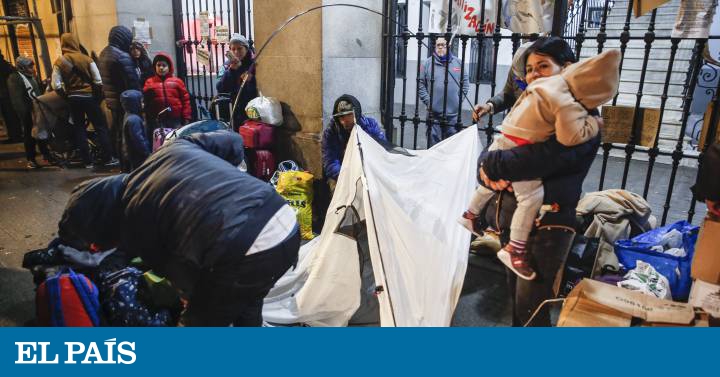
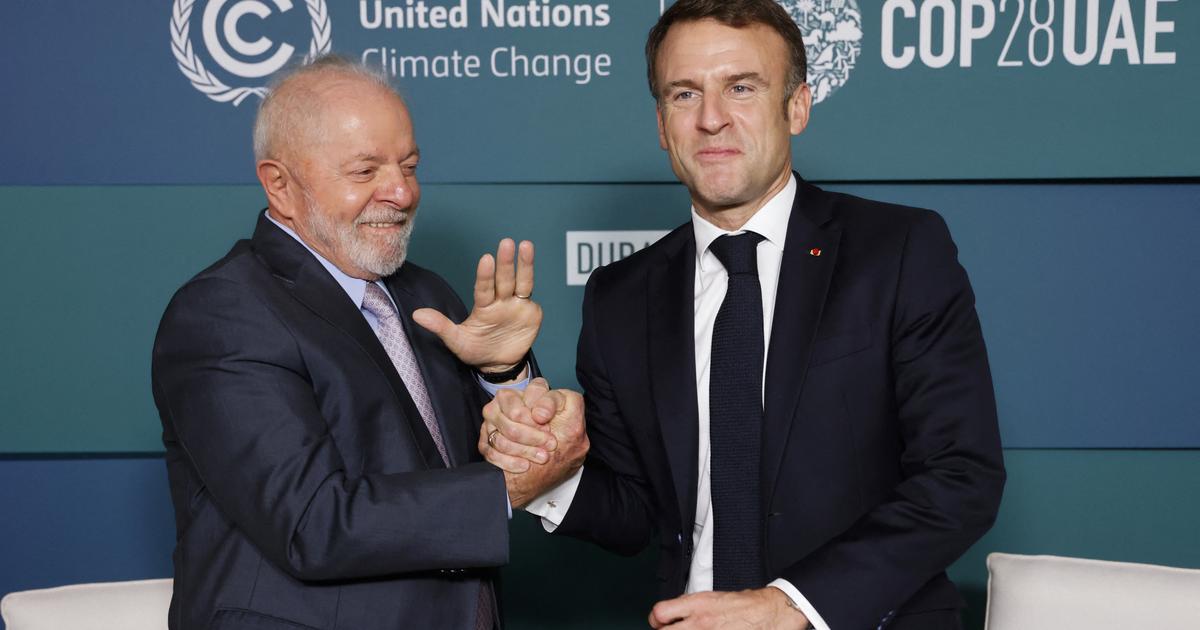
/cloudfront-eu-central-1.images.arcpublishing.com/prisa/GZBJJXO3EZE2HLSP5ZRRKYYYOY.JPG)
